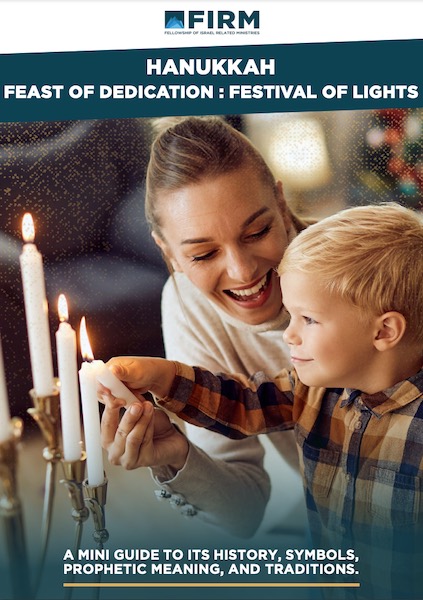Hanukkah and Christmas
The days of Hanukkah and Christmas quite often overlap. In rare instances Hanukkah coincides with American Thanksgiving. But more often, as Jews around the world celebrate the Festival of Lights, Christians celebrate (or are getting ready to celebrate) the Light of the World.
Is this an opportunity for the Body of Messiah to live out – and offer the world – a breakthrough testimony of Him? Is it possible that believers could give Israel and the nations a unique witness to the power of the Gospel? Hanukkah (literally, “Dedication”) is also known as the Festival of Lights. In the New Testament, it is mentioned briefly in John 10:22-23.
Download your FREE Hanukkah PDF Here:
The Hanukkah Story: Historic and Prophetic
The original Hanukkah dedication was a rededication of the Second Holy Temple in Jerusalem. The historical apocrypha, 1–2Maccabees, and Josephus, Antiquities of the Jews, record the events in detail.
To summarize, Israel had lapsed into a long period of spiritual decline. In the second century BC, the Seleucid emperor, Antiochus IV Epiphanes, overran Israel. The crazed conqueror erected a statue of Zeus in the temple and demanded that people worshiped this Greek god. Sadly, most Jews complied with his devilish demands.
But one family of faithful priests, the Maccabees, revolted. They organized a small military band that miraculously managed to defend the temple.
Hanukkah celebrates the Maccabees’ victory, culminating in the rededication of the temple on the 25th day of the Hebrew month of Kislev in 164 BC. Some scholars believe that, on the original Hanukkah of 164 BC, Kislev 25 coincided with what would become December 25 on the Gregorian calendar.
The Miracle of Hanukkah
In any event, historical legend states only one day’s worth of oil could be found with which to light the holy lampstand for the rededication on Kislev 25. The oil burned miraculously, however, for eight full days. Thus Hanukkah became an eight day holiday.
Many Bible scholars regard Antiochus IV Epiphanes (meaning “Manifest God”) as an anti-Christ figure or foreshadow.
To be sure, some of the anti-Christ prophecies of Daniel chapters 7-12 find various levels of fulfillment in Antiochus IV Epiphanes. But there is another important connection between the defeat of the anti-Messiah spirit and Hanukkah. And it relates to Christmas.
Connection to Christmas
But what if the Hanukkah victory of Kislev 25 never happened, and Israel disappeared from the map of the world? I dare say, the Messiah might never have been born. It is probably no coincidence, therefore, that according to Scripture, Yeshua was likely conceived in Mary’s womb on or about Kislev 25.
The reference point for this date of the Incarnation starts with the conception of John, born to Mary’s cousin Elizabeth, and her husband, Zechariah. John was conceived after the angel Gabriel encountered Zechariah during his priestly duties in the Temple. Zechariah was likely serving according to the priests’ rotation schedule of 1 Chronicles 24-28.
He belonged to the family division of Abijah, so he would have finished serving and gone home to Elizabeth in late June or early July. (Luke 1:5, 13-19, 23-26) A few months would have gone by. Then, by the time Mary visited Elizabeth, Elizabeth was six months pregnant with John. At the visit, Mary herself had just become pregnant.
By this reasoning, Messiah would have been conceived at or around Hanukkah. And as a result, He would then have been born at or around the Feast of Tabernacles. If the Incarnation did take place at Hanukkah, which commemorates Israel’s deliverance from the anti-God/anti-Christ spirit, then YHVH has given us yet another indication of Yeshua’s messiahship.
Hanukkah or Christmas?
This time of year, we – Jewish believers in Yeshua – often hear the question if Christians should celebrate Christmas. Surprisingly, these type of questions usually come from Gentile believers, not Jewish ones.
They point out that the holiday tends to camouflage the Jewish roots of Messiah’s incarnation. Instead, the world replaced these roots with folklore originating or associated with pagan deities. They grieve the extent to which Christmas centers on material greed and gluttony.
In that sense, I can’t say I disagree with them.
But for the sake of discussion, I can think of at least 10 reasons why Christians should still celebrate Christmas! I wrote the following list in the spirit of Romans 14:5: “One person considers one day more sacred than another; another considers every day alike. Each of them should be fully convinced in their own mind.”
Festival of (True) Light
Every Bible based, historical holiday celebrates the unchanging character and nature of God. At the same time, every historical holiday marks a unique phase, or progressive event, of redemption history. Hanukkah and Christmas represent different historical events and phases of redemption history. And even so, both celebrate the Light of the World. But there is more.
The two winter holidays also complement each other. Hanukkah serves as a back story to Christmas. Christmas amplifies the meaning of Hanukkah. We cannot fully understand, appreciate or celebrate neither holiday apart from the other. We can even see certain circumstances surrounding Hanukkah and Christmas as prophetically parallel. Hanukkah highlights the miraculous preservation of a people.
It is the people through whom redemption of all humankind would miraculously come. After He came, He was dedicated to God at the very temple that was rededicated at Hanukkah.
A Turning Point
The birth and dedication of our Redeemer and the restoration/rededication of the temple both take place during murderously dark periods of Jewish history. Both events are preceded by genocidal attacks at the hands of anti-God/anti-Christ rulers. In both instances, humble, faithful individuals overcame ruling powers. God is victorious and prepares the way at both Hanukkah and Messiah’s Incarnation for the next phase of redemption.
If God used mere, humble and faithful individuals to keep history on His intended course in the past, could He do so in the present and future? Might such individuals include you and me? If so, might He be giving us such an opportunity this Hanukkah/Christmas? Could He draw Jews and Gentiles in Messiah closer to Him and each other – and as a witness to the world?
God is maturing His people as one new humanity. He is preparing and refining us for the next phase of redemption history. It is for His glorious return. Part of that preparation is our expression to Israel and the nations of the Gospel, the good news of His redemptive love.
Jewish Childhood with Christmas Backdrop
In my lifetime, I have seen a tremendous amount of change in the Body of Messiah. Growing up as a religious Jew in post-World War II America, I could neither celebrate nor ignore Christmas. Every year, the local public school system required that I actively participate in Christmas assemblies and festivities.
My particular school fostered a culture in which I was accused of, and beat up for, being a “Christ-killer”. Otherwise, I might have at least enjoyed the forced absence from classroom work. But that was not the case. In my perception, Christmas was that dreaded time of year when Gentiles tried to make me worship three gods (Father, Son and Mother Mary). And, for some reason, a tree.
To top it off, the annual ritual took place, of all times, on or around Hanukkah. Hanukkah reminds Jews of the courageous faith of the Maccabees. They were to be our role models. But unlike the Maccabees, I was afraid to resist the ruling authorities of my little world.
Annually, I felt shamed before God in failing to confront what I perceived to be idolatry. I was shamed for being different (namely, Jewish). It was vexing and confusing. So confusing that, at one point, I actually wondered if my unMaccabee-like surrender to Christmas was the reason Santa never visited me!
Focus on Messiah
Thankfully, times have changed. Most Christians understand better how to relate to Jews, whether or not those Jews follow Yeshua. Many Gentile believers embrace their biblical, Hebraic roots of faith, including Hanukkah. Christmas is celebrated less and less (if at all) as the actual day of Messiah’s birth.
More and more, on this day Christians remember that God clothed Himself in dust to redeem humankind. Among committed Bible believers, the past focus on material gifts is shifting to The Gift. Globally, the Body of Messiah is maturing.
Here in Israel, more and more non-Orthodox Jews decide to visit Christian areas of the country at Christmastime. They want to enjoy the holiday music, food and decorations. Many of them are open to hearing the story of Christmas.
Gradually, even the Western Jews (secular ones) find the traditional Christmas spirit heartwarming. For most, Christmas is no longer a dreaded time of year.
Why should a Christian celebrate Christmas?
1. The Savior of mankind came from heaven to earth – an incomparable gift from God. If not born in December, He was quite possibly conceived in this season.
2. A testimony of Yeshua resonates across the earth through Christmas. We can all use it for the spread of the Gospel!
3. We can reach Jews and others in a unique way with the message of Christmas. Some Israelis are especially interested in Yeshua at this time of year. 4. Christmas can help protect religious freedoms. Some Jewish American conservatives have become strong advocates of Christmas for this very reason.
5. With Christmas comes Advent, a month of spiritual focus and expectation. It is generally less worldly in its expression.
6. Christmas traditions can draw families closer together. It is also an opportunity to share the love of God with those who don’t know their Savior.
7. Thankfully, most believers these days are aware of some of the pagan roots of Christmas. They avoid materialistic trappings. This acknowledgement frees them to celebrate with greater focus on Yeshua Himself!
8. Christmas is probably going to remain part of Western culture, at least for another while. If the righteous don’t preserve the holiday’s true meaning, secular expression could eliminate it altogether.
9. If Christians stop celebrating Christmas, some Gospel-resistant cultures may lose any public mention of Christianity at all! This holiday gives us an opportunity to talk about Yeshua in countries that maybe like the simple idea of Christmas lights.
10. Quite possibly God likes it when the global attention is directed to His Son – at least one day a year.
Time of Celebration: Happy Hanukkah and Merry Christmas!
Using the reasons above, give Christmas another thought. In December, does your family life focus on the life of Yeshua? Have you taken the opportunity to share your faith with a neighbor or a colleague? What better time to do it than on this holiday. And if it helps just one person – maybe it is not wrong for Christians to celebrate Christmas.
As for me, God reworked my own mind and heart about the holiday soon after I came to faith in Yeshua. But globally, God is doing something on earth that He has not done since New Testament times. He is refining Gentile and Jewish followers of Messiah around the world as one new humanity in Him. This Christmas and Hanukkah, why not participate – in integrity – in the move of His Spirit?
Embrace the biblically Jewish identity of your Savior and roots of your faith. Express your full biblical heritage in the uniqueness of your own national, personal and spiritual identity. If you celebrate Christmas, remember Hanukkah too. If you celebrate Hanukkah, do it with joy and praise for Messiah’s incarnation and birth. For Hanukkah’s Light, the Light of the World, has come!

Hanukkah Guide: Free PDF Download
More than just “the Jewish answer to Christmas,” what is Hanukkah exactly? Where did this holiday originate? How did Jesus celebrate it? How do we celebrate Hanukkah today?
You’re about to get these answers to these questions and uncover the symbols, prophetic meaning and traditions of Hanukkah.
Estimated reading time: 10 minutes



